Aqa coasts - Study guides, Revision notes & Summaries
Looking for the best study guides, study notes and summaries about Aqa coasts? On this page you'll find 95 study documents about Aqa coasts.
Page 2 out of 95 results
Sort by
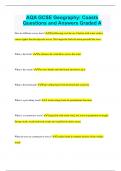
-
AQA GCSE Geography: Coasts Questions and Answers Graded A
- Exam (elaborations) • 8 pages • 2023
- Available in package deal
-
- £7.93
- + learn more
AQA GCSE Geography: Coasts Questions and Answers Graded A How do different waves form? Wind blowing over the sea. Friction with water surface causes ripples that develop into waves. The longer the fetch the more powerful the wave. What is the fetch? The distance the wind blows across the water What is the swash? The wave breaks onto the beach and moves up it What is the backwash? Water rolling back from the beach due to gravity What is a prevailing wind? A wind coming from the predominant di...

-
Coasts (AQA Geography A Level) questions and answers
- Exam (elaborations) • 8 pages • 2024
-
- £6.34
- + learn more
Fetch - ANSWER-Distance over which the wind blew. Wave break ratio - ANSWER-The ratio of the wave height to the wave length cannot be more than 1:7 as this is when a wave breaks. Swash - ANSWER-When a wave breaks, water is washed up the beach and can deposit sediment. Backwash - ANSWER-Water runs back down the beach and is capable of removing sediment from a beach. Constructive Waves - ANSWER-Add sediment to the shallow gradient beach and have high swash and low backwash. Longer waveleng...
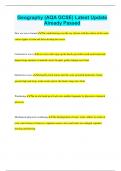
-
Geography (AQA GCSE) Latest Update Already Passed
- Exam (elaborations) • 12 pages • 2023
- Available in package deal
-
- £7.93
- + learn more
Geography (AQA GCSE) Latest Update Already Passed How are waves formed The wind blowing over the sea, friction with the surface of the water causes ripples to form and these develop into waves Constructive waves Low waves that surge up the beach, powerful swash weak backwash, deposit large amounts of material, crests far apart, gently sloping wave front Destructive waves Formed by local storms near the coast, powerful backwash, closely spaced, high and steep, weak swash, narrow the beach, stee...
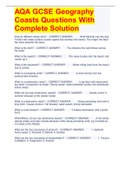
-
Bundle For AQA GCSE Exam Questions With Complete Solution
- Package deal • 5 items • 2023
-
- £19.43
- + learn more
AQA GCSE Geography Coasts Questions With Complete Solution 2 Exam (elaborations) AQA GCSE Biology Ecology Exam Questions With Complete Solution 3 Exam (elaborations) AQA GCSE Physics P1 Exam Questions With Complete Solution 4 Exam (elaborations) AQA GCSE Chemistry PAPER 1 Exam Questions With All Correct Answers 5 Exam (elaborations) AQA GCSE Bi

-
AQA GCSE Geography Coasts Questions With Complete Solution
- Exam (elaborations) • 5 pages • 2023
- Available in package deal
-
- £9.83
- + learn more
AQA GCSE Geography Coasts Questions With Complete Solution How do different waves form? - CORRECT ANSWER Wind blowing over the sea. Friction with water surface causes ripples that develop into waves. The longer the fetch the more powerful the wave. What is the fetch? - CORRECT ANSWER The distance the wind blows across the water What is the swash? - CORRECT ANSWER The wave breaks onto the beach and moves up it What is the backwash? - CORRECT ANSWER ...
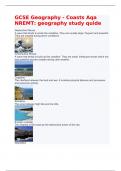
-
GCSE Geography - Coasts Aqa NREMT: geography study quide
- Exam (elaborations) • 11 pages • 2024
-
- £6.34
- + learn more
GCSE Geography - Coasts Aqa NREMT: geography study quide GCSE Geography - Coasts Aqa NREMT: geography study quide GCSE Geography - Coasts Aqa NREMT: geography study quide GCSE Geography - Coasts Aqa NREMT: geography study quide
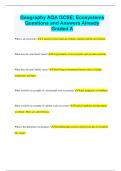
-
Geography AQA GCSE; Ecosystems Questions and Answers Already Graded A
- Exam (elaborations) • 6 pages • 2023
- Available in package deal
-
- £7.93
- + learn more
Geography AQA GCSE; Ecosystems Questions and Answers Already Graded A What is an ecosystem? A natural system made up of plants, animals and the environment What does the term 'biotic' mean? Living features of an ecosystem such as plants and fish. What does the term 'abiotic' mean? Non-living environmental factors such as climate, temperature and light. What would be an example of a local/small scale ecosystem? Pond, hedgerow or woodland What would be an example of a global scale ecosyste...
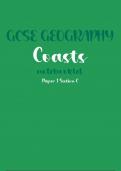

-
Geography Unit 1C — Coasts
- Summary • 9 pages • 2023
-
- £11.99
- + learn more
AQA GCSE Geography Unit 1C Coasts - summative note-booklet This document serves as a multipurpose tool to aid your GCSE revision, made by a Grade 9 student. It contains elaborate details of this unit in GEO Paper 1, including key learning points from the AQA specification. Through a plethora of diagrams, extensive explanations and condensed yet detailed notes, you can learn and revise this content effectively using this single note-booklet. Consider it your all-in-one revision guide!
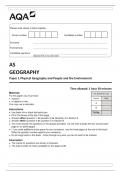
-
AQA AS GEOGRAPHY 7036-1 Paper 1 Physical Geography and People and the Environment Question Paper & Mark scheme June 2022.
- Exam (elaborations) • 123 pages • 2024
- Available in package deal
-
- £7.52
- + learn more
AS GEOGRAPHY Paper 1 Physical Geography and People and the Environment Time allowed: 1 hour 30 minutes For Examiner’s Use Section Mark A B TOTAL Materials For this paper you must have: a pencil a rubber a ruler. You may use a calculator. Instructions Use black ink or black ball-point pen. Fill in the boxes at the top of this page. Answer either Question 1 or Question 2 or Question 3 in Section A. Answer either Question 4 or Question 5 in S...
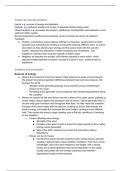
-
AQA A-Level Physical Geography | Coastal Systems and Landscapes
- Other • 13 pages • 2024
-
- £4.06
- + learn more
These are my notes for the Coastal Systems and Landscapes module of AQA A-Level Geography (7037), particularly Paper 1 - Physical Geography. I got an A* across the whole of A-Level AQA Geography, and my main way of revising was reading over these notes frequently, and doing consistent active recall/"blurting" using these notes. They contain all key and information needed for you to do the best in the exam, and get your well-deserved A*.

That summary you just bought made someone very happy. Also get paid weekly? Sell your revision notes on Stuvia! Discover all about earning on Stuvia


